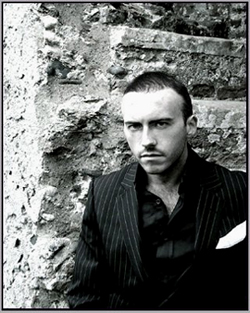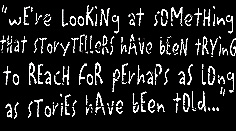![]()
May '10

by Simon Bestwick
1) First
of all, who’s Joseph Freeman? Tell us the story so far.
From time to time I still see mention of myself as a new writer but with 18 years in print, and at least another 7 writing before that, I'm a relatively old bugger at the game by now. Hopefully that means I'm still improving. Some of the rotten fruits of those early years of labour lurched forth in 2009 as 'October's Child', but my first actual book, 'Love Stories Of The Undead', appeared in 1999. There were a few years in which I wasn't writing (or at least completing) much of anything at all, due to suffering the kind of domestic upheaval Roger Corman used to inflict on Vincent Price, though 2007 onwards allowed me to concentrate upon what was really important in life and since then I've been more productive - and happier - than ever before. To date I've published 10 books. I once planned to retire at 30, but that age now finds me working harder than ever, and thoroughly enjoying it.
2) Second, Those Left Behind - tell us a
little about the novel (not too much though, don’t spoil it for me!)
‘Those Left Behind’ is a big supernatural novel set in a dying ex-mining village on the Yorkshire moors. It follows several characters, who we meet at particularly interesting points in their lives, each of whom have lost somebody in various ways and are searching for some kind of resolution. What they find instead is a rather nasty part of the village’s history, which threatens worse than their lives.
3) Where did the inspiration for Those Left Behind come from?
There were a number of things I wanted to write about, though by no means all of them came together in the final version. Grief and loss and the effect which that has on people. The dramatic and foreboding Northern landscape, which fascinated me as a child when I grew up surrounded by it. The lives and secrets in an isolated rural community. And let’s not forget it’s a horror novel: I was also initially inspired by the stone-tape theory of ghosts, which is why there’s a lot of mention of the rocks, the quarry and the electrical storms – and also by the idea that every couple of thousand years the earth’s magnetic polarity shifts. Neither of these ideas were really developed in the final novel, but by then it had taken on enough of a life of its own to keep my hands full.
4) What drew you to write in the horror genre?
I’m not sure that I actually have a choice, nor want one. Any true artist must also be true to themselves, and will be drawn to the area that offers them the biggest canvas. I find that horror allows me to say everything that I want, and the challenge of continuing to do that, and pleasing myself, keeps me working in it. As a fan myself from being a very young child, as a reader or watcher of the films, the genre has given me a great deal of pleasure which I think a lot of us in the field want to pay back, and pass onto others. Also, when one is dealing with elements of the supernatural and the paranormal, there is continually the awesome sense of other worlds just brushing our own, and what happens when the smallest corner of that curtain is raised and we risk a glimpse beyond. Nothing else, for me, quite captures that.
5) Mention ‘horror’ to a lot of people and if
you’re lucky they’ll think Stephen King; if not they’ll think of
‘torture porn’ like Hostel. Why do you think that is?
From an early age I found it sad that a field can be associated with its worst elements. And alas what is best is not always what is popular, good things take effort to appreciate and therefore the rubbish is popular and gives it a bad name. Stephen King is popular because he's fairly accessible, and also well established in a way that writers, especially of horror, don't become anymore. So many people say they don't like horror and yet when I talk to them they nearly all agree that they enjoy ghost stories, or a good creepy subtle tale rather than the blood and gore they perceive as being all that horror is about. It's undoubtedly an image problem, and many writers are either scared away from the genre (though their motivation for that is more usually a financial one) or twist themselves into knots trying to come up with some other way of describing what they do. I think to some extent that's avoiding the problem, and perhaps even keeping it going.
6) Following on from that; obviously there’s a
lot more to horror as a genre, so what books, stories or authors would you
particularly recommend? (Apart from me, obviously.)
I find a great deal of reward in work that can offer glimpses of the eternal, the awesome, or even just the downright weird, through carefully-crafted and subtle techniques. We’re looking at something that storytellers have been trying to reach for perhaps as long as stories have been told. What Lovecraft deemed ‘cosmic horror’, Blackwood’s visionary evocations, or James’s ‘pleasing terrors’. Certainly M. R. James taught me what ghosts could be, and Algernon Blackwood showed me what the ghost story could be. Ramsey Campbell the effect that language could have and the joy of crafting it, Robert Aickman, Reggie Oliver, Terry Lamsley and so on for weirdness that haunts the reader. There are many other authors, and so many stories or books that I would recommend that I do often draw up recommended lists for would-be readers.
7) Do you have any particular writing ritials?
Only to write every day and to keep going until the work is done. Wherever and whenever that might be. I try to be done by afternoon, and not get disheartened if the day's writing isn't setting the world alight, realising that some days are better than others and when one looks back over the finished product the rough days are not as obvious as one imagines they will be. The good days pay off, and more than redress the balance as far as I'm concerned. And that’s pretty much it. I’ve made the mistake in the past, as many writers or would-be writers continue to do, of setting unnecessary rituals and really all they end up being are ways of avoiding the work and open doors to the mythical beast of writers block. But beyond the act itself, I find that reading a lot keeps the language fluent. Research helps avoid becoming stilted when writing about things one doesn't know; which is often apparent to a reader.
8) What advice would you give to aspiring writers?
Just to keep going. There are people who talk and people who do. You're only a writer if you write. Shape your work. Orchestrate it. Listen to feedback but don't take it as gospel. Find what you're good at and keep crafting it but always produce something! Don't get disheartened about markets or money. Write for the love of it and for the appreciation from readers, and for trying to add to the field. Recognize the fact that you might never earn a penny from what you’re doing, and if that troubles you then give up.
9) If you could make sure one piece of your work
would survive in 500 years time, what would you put in the time capsule?
I always feel that it's the one I'm about to write next, which is part of what keeps me going. But to date, 'Those Left Behind' is certainly everything I wanted a novel to be, and as for the short stories... I’d have to sift through 'Ready Or Not', 'Seen But Not Heard', 'Far From Home', ' A Prayer For The Morning', 'Voice Of The Denizen', and probably a couple of others which I think also show enough of what I’m all about.
10) What’s next?
I’m currently halfway through writing a big novel called 'The Cold Heart Of Summer'. There’ll be a new collection of tales either later this year or early in the next one, and I’ve still a couple more novels to publish, the next of which will be 'The Lost And The Lonely' in 2011. 'Aracadia Lodge' will be my next one to write, about a group of people who were touched by nature and find themselves being called back to it.
Joseph Freeman, thank you very much...
Joseph Freeman's latest novel, 'Those Left Behind' is available now. Go
here for more details.

